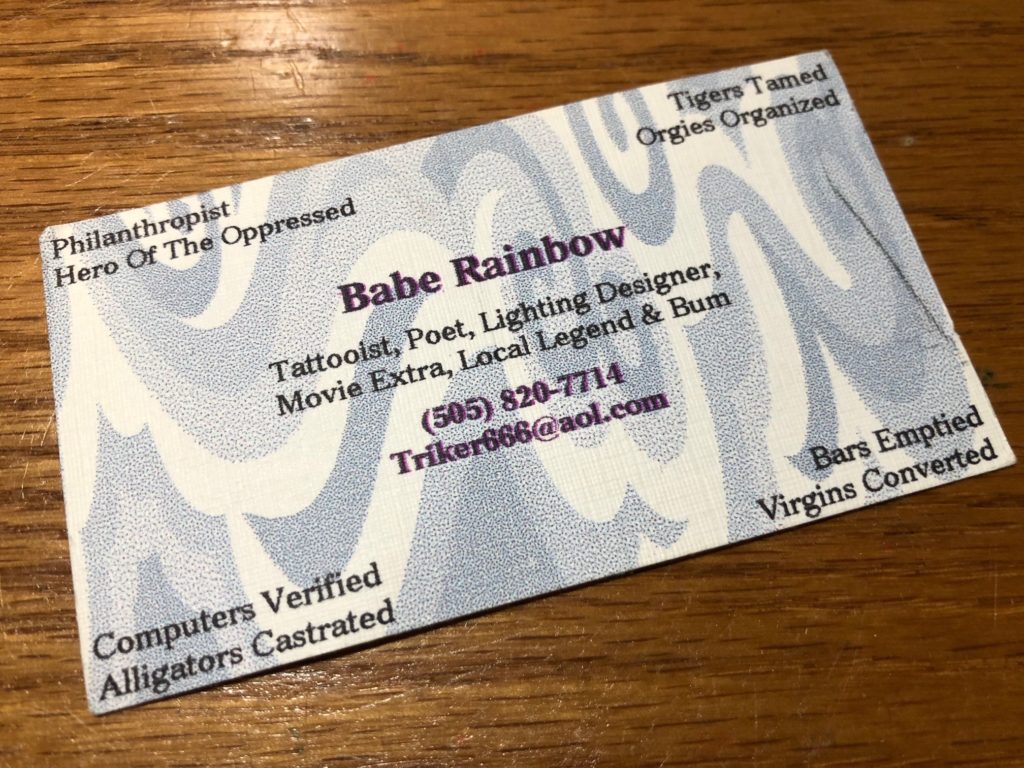This is a love story desperately seeking an end.
Almost every day for the past 17 years, Babe Rainbow has looked for one face in the crowd that passes his corner.
He sees her face in his mind, framed against hazy memories of San Francisco’s Haight Street in the Sixties. That picture flickers through his brain whenever he sees a woman who might be the frail, blond foundling—her street name was Spooky Boots—whom he lost.
She hasn’t passed by—yet—but he knows now that she might be nearby.

Babe Rainbow, 36, has become a sort of local landmark in the meantime. The dwarfish street bum has sat in one place across from the La Fonda almost every day in that time, eyeballing a million faces through his dark, biker glasses.
“This guy Carl once told me, when he was tired of hearing me whine about Spooky, that if I stood in one place long enough, everybody in my life would pass by,” Rainbow says.
So, he began looking or a place to stand from which the world couldn’t move him. Some corners were better than others, and when he came to Santa Fe 15 years ago, he eventually parked himself across the street from the posh-adobe downtown hotel.
A few weeks ago, he heard on the street that his long-lost Spooky Boots might have migrated to a medicine lodge in South Dakota, and was to be among the people of Cochiti Pueblo this weekend.
No matter what happens, there will be an end to this Rainbow.
If he actually finds his lost love, his waiting is over. If he doesn’t, “I’ll go to another corner. I really hate this one.”
* * *
Rainbow won’t tell his real name, but he will tell that he ran away from home when he was 16. He dropped into the Haight-Ashbury scene in the middle of the hippie Sixties, but he had material ideas. He managed a rickety apartment house on Haight Street for $400 a week.
He met Spooky Boots in that apartment house, where tenants often left without notice or were busted and unknowingly left their worldly goods to Babe Rainbow.
Their meeting was a bizarre fantasy that might or might not have been influenced by an acid trip. But Spooky moved in with him soon after. Rainbow’s life and love changed. Spooky changed it.
Then they decided to move to New York. She urged him to go shead and get a pad, but he hesitated to leave her, even briefly. She insisted. Their parting had a sentimental twist, though: He gave her his trademark purple sunglasses to wear like a St. Christopher’s medal. “I might as well have cut off my arm or cut out my heart and handed it to her and told her, ‘Here, keep this til I get back.’”
He begged her from New York to join him, but she put him off gently. She’d taken over his job as and apartment manager and she wanted more money for their life together.
No matter. He never saw her again.
It’s a weird story, but Rainbow wears a button every day that says, “Being weird is not enough.”
* * *
Here’s a sobering thought: “I was just thinking that maybe she’s been on a street corner in South Dakota waiting for me to pass by,” Rainbow says.
Rainbow is not a narc, an outlaw biker, or a psychopath rapist, all rumors he’s heard about himself. “Hell, some people have asked me if I really own La Fonda,” he says.
(Well, he looks like an outlaw biker. His long, straight hair is parted by a sharp face overgrown with wild sideburns. His glasses perch on the tip of his long nose as he peers over them at passersby. He wears dirty jeans, T-shirts, and a leather vest, so nobody exchanges pleasantries with him unnecessarily.)
He is, in his own words, “just a street bum.” He earns a little cash for working at Club West as a lighting technician on show nights. He sleeps in his truck. He props himself against the sunny side of San Francisco Street almost every day. And he once owned a tattoo parlor in La Fonda.
By virtue of his literal station in life, he’s been in countless family photos, a couple commercials and movies, and his picture hangs in a local history museum.
“But in my definition, I’ve not yet really worked—except for two weeks in the San Francisco post office one Christmas,” he says.
And most of the people in his life have passed by in 15 years—except Spooky, his ex-wife, and his mother.
He got his name like someone seeking answers from the I Ching. In the depth of his misery over losing Spooky, he grabbed one of his thousands of LPs. It was one by Melanie, and the song was “Babe Rainbow.” It stuck. Like the idea of waiting on a corner for prodigal lover.
“I just wanted to die (after she left). I sat around eating Twinkies … then I decided I don’t mind dying, but I don’t want to go crazy.”
What will happen if and when they meet again?
“I have sat back, closed my eyes and dreamed about it.
“I see her across the room and she sees me. We slo-mo into each other’s arms and embrace for about an hour. Then we go off into the sunset.
“But I have another dream, too. We see each other and she comes up to me and says, ‘I’ve been looking for you for 17 years.’
“Then she reaches into her purse, pulls out a gun, and blam-blam-blam.”
Staff writer Ron Franscell’s story first appeared in the Santa Fe (NM) New Mexican in 1984 … or thereabouts.
